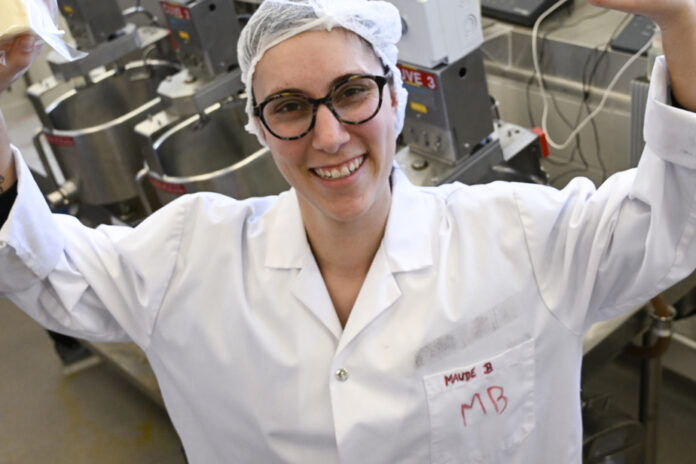When she began her studies, Maude Blouin was looking for something both scientific and practical. She quickly discovered a fascination with what happened behind the plate during food processing. She therefore opted for the bachelor’s degree in food science and technology, offered at Laval University.
“We eat three times a day, but we don’t necessarily ask ourselves where these foods come from, how they are made,” says Maude Blouin, 28.
It was after starting her CEGEP in natural sciences that she wanted something more concrete. She therefore headed for a college diploma in process techniques and food quality where she discovered a passion for food processing. She then undertook a bachelor’s degree in microbiology at Université Laval to deepen her scientific knowledge, but quickly returned to her first love by branching out to a bachelor’s degree in food science and technology.
“In the first year, you learn the basics, so there are courses in microbiology, which have been credited to me, in biochemistry and on quality standards in the food industry”, lists the native of Repentigny who settled in Quebec City for her university studies.
Then, in the other years of the baccalaureate, the students enter more into the heart of the action. “For example, we have courses on the processing of dairy products,” she says. There is a whole magic that happens when you see milk turn into cheese. »
Then she says she had to create a sausage recipe and make it. “There’s a lot of labs to do in the program,” says the one who loved her experience so much that she’s now doing her master’s in food science.
When you ask Maude Blouin what is the biggest challenge facing the food industry, without hesitation, she talks about sustainability. “We also have a course in the field in the baccalaureate,” she says. There is also a lot of research being done in analyzing the life cycle of food and then reducing the use of plastic and food waste. »
She gives the example of cheese, which generally has a yield of 10%.
For her part, she focuses on modifying the diet of dairy cows. “When you supplement it with fat, for example, it produces more milk in a day and also more fatty milk,” says Maude Blouin. I am looking to see if this can allow milk to better retain fat when it is transformed into cheese. Then what happens with his protein? We want to see, for example, if supplementing the cow with fat makes a difference when making cheddar aged 6 months, or 12.”
When she looks to the future, the student realizes that she has developed a passion for research and that she would like to work in the field, without however managing her own laboratory. “Or,” she says, “I would like to work at the Center d’expertise fromagère du Québec, which hires expert advisors who will visit small artisanal cheese dairies when they need it to help them meet certain challenges. »















